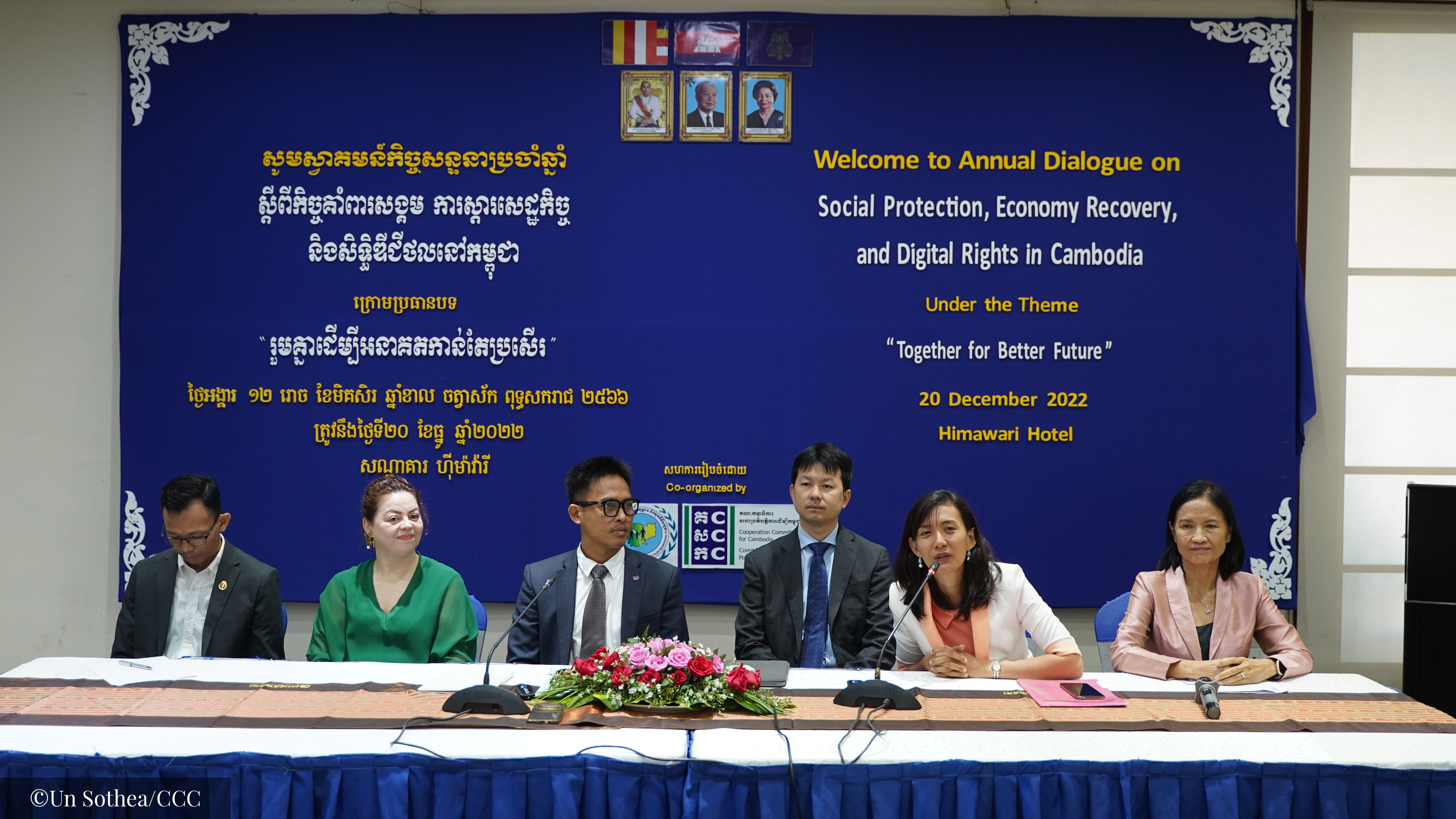Remarks by Ms. Alissar Chaker, UNDP Resident Representative
Annual Dialogue on Social Protection, Economic Recovery and Digital Rights in Cambodia
December 20, 2022

Ms. Alissar Chaker (in green dress)
H.E. Samheng Boros, Minister attached to the Prime Minister and Secretary of State of the Ministry of Social Affairs, Veteran and Youth Rehabilitation
H.E. Sok Puthyvuth, Secretary of State, Ministry of Post and Telecommunications
Ms. Chi Socheat, Executive of Population Service International (PSI) and Chair of the Executive Committee of the Cooperation Committee for Cambodia
Ms. Sin Putheary, Executive Director, Cooperation Committee for Cambodia
Excellencies, Ladies and Gentlemen,
I am delighted to participate in this annual dialogue “Together for a Better Future”, and to reflect with you on social protection, economic recovery and digital rights, and their role in building resilience and accelerating sustainable development in the Kingdom.
I would like to begin by commending the strong partnership among the various stakeholders working on strengthening the social protection system and supporting socio-economic recovery in Cambodia and the commitment of the Royal Government of Cambodia for assuming the responsibility and investing from its national budget to expand cash assistance transfers to the Kingdom’s most vulnerable families, responding quickly to the socio-economic impacts of the COVID-19 pandemic. COVID-19 cash transfers have reached 700,000 poor and vulnerable households so far. This is an unprecedented achievement and should encourage the Royal Government of Cambodia to raise the level of our ambition.
The recent independent assessment of the Socio-Economic Impact of the COVID-19 Cash Transfer Programme for Poor and Vulnerable Households conducted with Ministry of Economy and Finance and the General Secretariat of the National Social Protection Council found that the programme supported positive coping mechanisms and contributed to reducing poverty and improving the socio-economic resilience of its recipients. It also slowed the erosion of development gains achieved during the last two decades (GDP, poverty, and unemployment), during the taxing times of the COVID-19 crisis. Based on three rounds of surveys administered from December 2020 to June 2021, evidence was collected on the significant impacts of the cash transfer programme on human development and socio-economic resilience, including food security, nutrition, children education, saving, debt repayment, productivity, health, gender empowerment, and positive perception of local/national governments. The empirical findings also dismissed the concern over 'moral hazards' such as idleness and reliance on transfers among cash recipients.
UNDP is proud to have contributed to the strengthening of the social protection system in Cambodia from rapid and digitalized on-demand registration of poor household at the onset of COVID-19 pandemic in 2020, to technical support for strengthening the targeting and feedback mechanisms for ensuring social assistance reaches people who need it most, to the generation of policy evidence for making the case to invest in social protection and inform the government on effectiveness and lessons learnt. In addition, UNDP is supporting the piloting of the Graduation Based Social Protection Model that aims to strengthening the productive capacity of targeted households for supporting their exit from poverty and enhancing their resilience to future shocks. We are also supporting the policy reflection and analyses on the extension of social protection to the informal sector and elderly citizens. These initiatives are implemented with Ministry of Economy and Finance, Ministry of Social Affairs, Veteran and Youth Rehabilitation, General Secretariat of the National Social Protection Council, Ministry of Planning, and International Labour Organization (ILO).
Excellencies, ladies and gentlemen,
Social protection is a human right. It is a potent tool for combating inequality and an essential instrument for reducing poverty and promoting social inclusion. COVID-19 has made it clear that social protection is not a cost, but an investment in people. It not only helped in preventing households from spiralling into deep poverty and deprivation, but also protected the economy from falling into a deeper recession. It lays a stronger foundation for a more inclusive, robust, and dynamic recovery.
Since 2020, UNDP has released three Policy Briefs on Economic and Social Impact Assessment of COVID-19 in Cambodia, the latest on the impacts of the war in Ukraine was launched last month. These served as input to the COVID-19 cash transfer scheme, SMEs stimulus measures and recovery planning.
The pandemic has accelerated digital transformation. Digital innovation was instrumental in social protection schemes (registration, cash transfer, etc.) and ensuring business continuity and e-commerce. UNDP, in partnership with the Ministry of Commerce and Khmer Enterprise, supported 2,400 businesses to go online and leveraging the capacity of alternative media networks to counter COVID-19 Infodemic (information pandemic), prevent social stigma and promote social cohesion.
While digital transformation has brought incredible benefits to the society, if left unchecked, it can exacerbate existing inequalities and reinforce biases. A pre-requisite for digital rights for citizen is the need to address digital divide in terms of access and knowledge/ skills to engage meaningfully and safely on digital platforms. The Royal Government of Cambodia’s Digital Economy and Society Framework 2021-2035 sets the standards for a whole-of-society approach to digital transformation that leaves no one behind. UNDP offers on digital transformation support coordinated approach between government, civil society, and the private sector to build ownership, support human-centered design, mitigate risks, and establish trust and accountability.
Excellencies, ladies and gentlemen,
To end my remark, allow me to thank the organizers, government partners, UN agencies, development partners, civil society, and the private sector for their commitment, support, and spirit of partnership, well captured in today’s theme “Together for Better Future”- a paramount requisite for achieving the next mile.
I wish you all a good continuation and a prosperous 2023.
Thank you.

 Locations
Locations